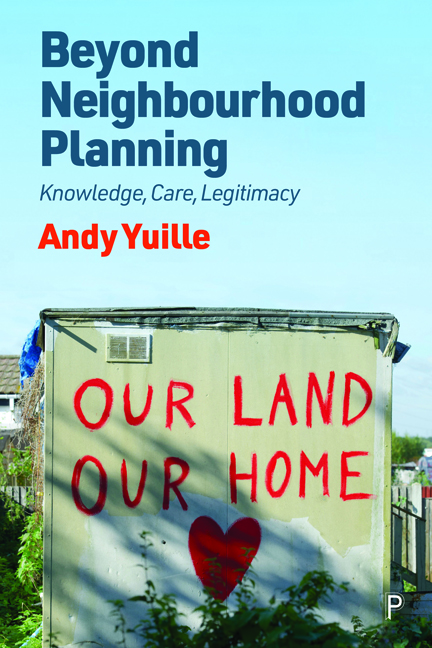Book contents
- Frontmatter
- Contents
- List of figures and table
- Acknowledgements
- Preface
- 1 Introduction: Neighbourhood planners and the turn to participation
- 2 Planning, participation and democratisation
- 3 Knowledge, politics and care: perspectives from Science and Technology Studies
- 4 Neighbourhoods, identity and legitimacy
- 5 Experience, evidence and examination
- 6 Expertise, agency and power
- 7 Care and concern
- 8 Conclusion: Neighbourhood planning and beyond
- Notes
- References
- Index
4 - Neighbourhoods, identity and legitimacy
Published online by Cambridge University Press: 20 January 2024
- Frontmatter
- Contents
- List of figures and table
- Acknowledgements
- Preface
- 1 Introduction: Neighbourhood planners and the turn to participation
- 2 Planning, participation and democratisation
- 3 Knowledge, politics and care: perspectives from Science and Technology Studies
- 4 Neighbourhoods, identity and legitimacy
- 5 Experience, evidence and examination
- 6 Expertise, agency and power
- 7 Care and concern
- 8 Conclusion: Neighbourhood planning and beyond
- Notes
- References
- Index
Summary
The neighbourhood has emerged as a precocious new actor in the contested production of space.
Bradley et al (2017: 71– 72)Introduction
Neighbourhood planning is framed by its promoters as a straightforward transfer of power from state to existing communities. In this chapter I examine the experience of two case studies in order to problematise this framing, drawing on some of the approaches outlined in the previous chapter to ask questions about identity, representation and legitimacy. As planning scholar Quintin Bradley observes in the opening quotation, ‘the neighbourhood’ has become a significant participant in the world of English planning. And as he says, this ‘precocious actor’ is new: it is not simply the case that ‘the neighbourhood’ is straightforwardly equivalent to the community to which the state is supposedly devolving power. This chapter thus engages with one of the central dilemmas in participatory experiments in democracy – in the absence of formal representative democracy, what legitimises the actions of citizens or groups that claim, or are implied, to represent others? How do they come to be legitimate intermediaries between community and state? And, given that the landscape and experience of participatory democracy is diverse and fragmented, is there anything that can be learned from the situated construction of legitimacy in neighbourhood planning that might be made to travel to other locations – and vice versa?
In this chapter I describe how neighbourhood planning produces two new, mutually dependent ‘actors’: local communities as ‘neighbourhoods’ and neighbourhood planning groups (NPGs) as their spokespeople. I then focus on the fluidity and multiplicity of the NPGs’ identity, tracing their performance of three distinct identities or versions of themselves in relation to the neighbourhood. I draw attention to the ways in which each identity confers a different kind of legitimacy on the NPG, by enacting different relations with the neighbourhood through different kinds of knowledge practices and modes of representation. However, there are also tensions and conflicts between the different identities. I suggest that holding these identities together in different ways will lead to different enactments of neighbourhood – will make different worlds visible to be acted upon. I then consider the ways in which the enactment of these multiple identities can also be seen in the other modes of participatory democracy described in Chapter 1.
- Type
- Chapter
- Information
- Beyond Neighbourhood PlanningKnowledge, Care, Legitimacy, pp. 90 - 126Publisher: Bristol University PressPrint publication year: 2023



